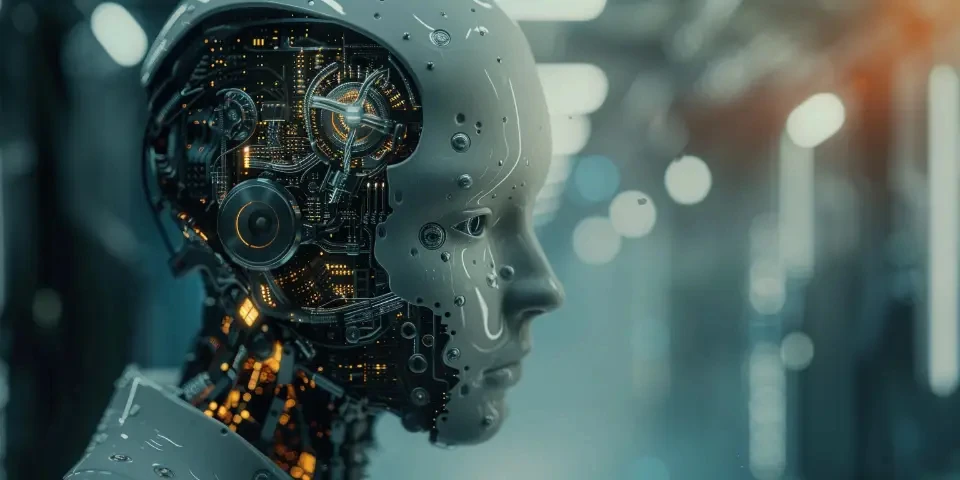Healthcare Redefined How AI is Revolutionizing Medical Diagnosis and Treatment
Advancements in artificial intelligence (AI) are transforming the healthcare industry, revolutionizing medical diagnosis and treatment. AI has the potential to enhance medical professionals' capabilities, improve patient outcomes, and streamline healthcare workflows. In this article, we will explore various aspects of AI's impact on healthcare.
1. Enhanced Medical Imaging
AI-powered algorithms can analyze medical images, such as X-rays, CT scans, and MRIs, with incredible accuracy and speed. These algorithms can help detect abnormalities, identify tumors, and assist radiologists in making precise diagnoses. By leveraging AI, healthcare professionals can expedite the diagnosis process and provide more effective treatments.

Moreover, companies like Aidoc and Zebra Medical Vision use AI to develop software tools that automatically flag anomalies in medical images, enabling radiologists to prioritize critical cases and reduce time spent on reviewing normal scans.
2. Predictive Analytics for Early Diagnosis
AI algorithms can analyze vast amounts of patient data, including electronic health records, genetic information, and lifestyle factors, to predict the onset of diseases. By identifying patterns and risk factors, AI can enable early diagnosis of conditions like cancer, cardiovascular diseases, and diabetes. Early detection significantly improves the chances of successful treatment and reduces healthcare costs.
For example, the company Tempus uses AI to analyze clinical and molecular data to personalize cancer treatment. This helps physicians make informed decisions by identifying the most effective therapies based on individual patient characteristics.
3. Personalized Treatment Plans
AI can assist healthcare professionals in developing personalized treatment plans based on each patient's unique characteristics and medical history. Machine learning algorithms can analyze vast amounts of patient data to identify optimal treatment options and predict treatment outcomes.
One notable application is IBM Watson for Oncology, which uses AI algorithms to provide evidence-based treatment recommendations for cancer patients. By leveraging AI, physicians can consider a broader range of treatment possibilities and select the most suitable course of action.
4. Robotic Surgery
AI-powered robotic systems are transforming how surgeries are performed. Surgeons can use these systems to perform complex procedures with enhanced precision, minimal invasiveness, and reduced human error. The robots can also analyze real-time data during the surgery, allowing surgeons to make informed decisions swiftly.
Da Vinci Surgical System is a prominent example of AI-powered robotic surgery. It provides surgeons with a 3D visualization system and robotic arms that mimic human movements, enabling them to carry out delicate operations with utmost precision.
5. Improving Drug Discovery
A traditionally lengthy and expensive process, drug discovery is being revolutionized by AI. Machine learning algorithms can analyze vast data sets, including biological, chemical, and medical databases, to identify potential drug candidates. This accelerates the drug discovery process and reduces the time and cost involved in bringing new treatments to market.
Companies like BenevolentAI use AI algorithms to predict associations between drugs and diseases, enabling researchers to identify new therapeutic targets and repurpose existing drugs for different conditions.
6. Virtual Assistants for Healthcare Professionals
AI-powered virtual assistants, such as IBM Watson Assistant and Amazon Alexa, can assist healthcare professionals by providing quick access to relevant medical information, drug interactions, and treatment guidelines. These assistants can also serve as language translators, facilitating communication with non-English speaking patients.
With these virtual assistants, healthcare professionals can save time, increase efficiency, and access information on the go, ultimately improving the quality of care provided.
7. Remote Patient Monitoring
AI facilitates remote patient monitoring, allowing healthcare professionals to monitor patients' vital signs, symptoms, and adherence to treatment plans from a distance. AI-powered wearables and sensors can collect real-time data and alert healthcare providers in case of any abnormalities.
For instance, companies like Biofourmis develop wearable devices and AI algorithms to monitor heart rate, respiratory rate, and activity levels. This enables physicians to intervene promptly and prevent healthcare emergencies.
8. Ethical Considerations and Privacy
As AI becomes more pervasive in healthcare, ethical considerations surrounding patient privacy, data security, and algorithm bias become paramount. It is crucial to ensure that AI technologies comply with strict privacy regulations and uphold patient confidentiality. Additionally, transparency in algorithm design and continuous monitoring is essential to identify and rectify biases that may exist in AI systems.
Frequently Asked Questions:
Q: Will AI replace healthcare professionals?
A: No, AI will not replace healthcare professionals. Instead, it will augment their capabilities, allowing them to make more informed decisions, improve efficiency, and provide better patient care.
Q: Can AI algorithms be trusted for accurate medical diagnoses?
A: AI algorithms have demonstrated great accuracy in medical diagnoses, often outperforming human experts. However, it is essential to consider the limitations of AI systems and have human oversight to ensure accurate and reliable results.
Q: How can AI contribute to reducing healthcare costs?
A: AI can contribute to reducing healthcare costs by enabling early diagnosis, personalized treatment plans, and streamlining healthcare workflows. It can also help identify potential inefficiencies and areas for cost-saving within healthcare systems.
References:
1. Smith, R. (2018). Artificial intelligence: reshaping the future of Medicine. The Lancet, 392(10162), 1907-1908.
2. Koenecke, A. (2020). AI in healthcare: broken promises only hurt those who believe them. Nature Medicine, 26(1), 16-20.
3. Topol, E. (2019). High-performance medicine: the convergence of human and artificial intelligence. Nature Medicine, 25(1), 44-56.
Explore your companion in WeMate